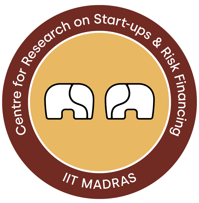Conference Papers
Conference Papers
Circular Economy Adoption: Exploring the Differential Uptake of Circular Practices between Indian Start-ups and Incumbents Nandhini Priya N, Dr. Thillai Rajan A. 6th International Conference on Financial Markets and Corporate Finance (ICFMCF 2024), IIT (ISM) Dhanbad, 2024.
Abstract
This paper proposes to understand the growing academic interest in understanding the circular economy adoption in both smaller firms (Circular Start-ups) and larger established firms (incumbents) through bibliometric analysis and visualization using VOSviewer software. A final set of 327 relevant articles are identified upon scrutiny from both Scopus and Web of Science (WoS) for the period 2000-2023. The study identified and analyzed the articles in this field and scrutinized them to understand the challenges faced by both small and large firms in implementing CE principles in their business models. Further, along with pointing out the challenges faced by both incumbents and Circular Start-ups (CSUs) in ensuring transition towards CE, the study also identified numerous future research scopes along with narrowing down the sector to focus on. Though there has been an increase in research interest in the field of CE in India, there's a lack of comparative studies between CSUs and incumbents in the existing literature, and hence the study intends to proceed with the comparative analysis in the Indian context.
Balancing financial value creation and environmental impact: Evidence from Climate Tech startups, Madhavan Nampoothiri, Thillai Rajan A. 1st International Confluence Conference on Startups and Innovation (ICCSI 2023), IIT Madras, 2023
Abstract
Climate tech startups are hybrid organizations that combine environmental and economic objectives to combat climate change. Our multiple case study analysis of 15 Indian climate tech startups reveals that climate tech entrepreneurship is a dynamic construct influenced by time, as a startup scales, financial value creation objectives take precedence over climate impact objectives, and the changing behaviour of external stakeholders, especially the government, shifts the priorities of climate tech entrepreneurs throughout their entrepreneurial journey. This research contributes to the literature of hybrid organizations, shedding light on how the initial entrepreneurial intentions of climate tech entrepreneurs transform over time.
Niroopa Rani Annamalaisami, Thillai Rajan Annamalai, “A Study on Investment Decisions of Angel Investors of Indian Startups”, POMS 30th Annual Conference 2019, Washington Hilton, Washington, D.C., U.S.A
Abstract
Indian startups are growing fastest nowadays and obtained acclamation for being the 3rd largest startup economy. Studies on startups have compared different types of investors naming angel investors, venture capitalists, banks etc., from various perspectives. However, studies analyzing the intra-investors features, especially amongst the angel investors in terms of their characteristics, investment pattern, and risk management strategies, are sparse. Further, studies on angel investors of the Indian economy are very few. This paper attempts to meet the research gap by analyzing the differences amongst angel investors in the Indian context. This study further explores the homogeneity (heterogeneity) nature of the angel investors and the factors influencing their investment decisions and risk-taking ability. Parametric statistical tests were used to analyze 751 angel investments made in Indian startups during the period 2014-2018. The study's findings show that the angel investors belong to different types such as business angels, emerging angels, and technology angels are homogeneous in terms of their demographic and geographic factors and heterogeneous in terms of their behavioral and psychological factors. It is found that the business angels and non-business angels are different in terms of their behavioral factors such as the number of co-investors, deal amount, and psychographic factors such as entrepreneurial experiences and employment status. The emerging angles follow the same pattern as business angels except for the employment status, which does not differentiate between the emerging and non-emerging angels. The technology angels are heterogeneous in terms of investing experience, the number of investors in a round, deal amount, and psychographic factors such as entrepreneurial experiences and employment status.
Niroopa Rani Annamalaisami, Thillai Rajan Annamalai, “Does age make a difference amongst the angel investors”, International Conference on Business, Management and Economics (December 2018), Berlin, Germany
Abstract
Indian startups are growing fastest nowadays and obtained acclamation for being the 3rd largest startup economy. Studies on startups have compared different types of investors naming angel investors, venture capitalists, banks etc., from various perspectives. However, studies analyzing the intra-investors features, especially amongst the angel investors in terms of their characteristics, investment pattern, and risk management strategies, are sparse. Further, studies on angel investors of the Indian economy are very few. This paper attempts to meet the research gap by analyzing the differences amongst angel investors in the Indian context. This is the earliest study to analyze whether the angel investors of different types are homogeneous in terms of their age or not. This study further explores the influences of angel investor's age in their investment decisions and risk-taking ability. Parametric statistical tests were used to analyze 1243 angel investments made in Indian startups during 2014-2018. The study's findings show that angel investors belong to different education levels, occupational background, domicile, industrial experience, functional area experience, investment experience are heterogeneous in terms of age. It is found that the angel investors are living in metro cities holding post-graduation and above, working in the corporate/academic sector with general management expertise, and having investment experience of 11-15 times appear to be significantly older than their other counterparts. A positive correlation found between the age of investors and the age of the startups shows that elderly investors are more risk-averse in nature and tend to invest in well-established firms than early-stage ones.
